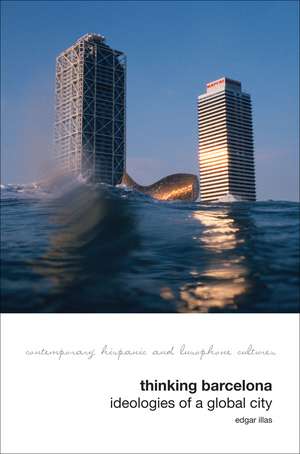Thinking Barcelona – Ideologies of a Global City
Autor Edgar Illasen Limba Engleză Hardback – 9 oct 2012
Thinking Barcelona studies the ideologies that redefined Barcelona during the 1980s and helped the city adapt to a new economy of tourism, culture, and services. Looking specifically at the lead-up to the 1992 Olympic Games and the urban renewal geared toward establishing Barcelona as a happy combination of European cosmopolitanism and Mediterranean rootedness, Edgar Illas situates Barcelona as a key example of contemporary urban rebranding after the fall of communism and the establishment of the neoliberal “end of history.” Looking at a host of materials associated with the games as well as contemporary architectural and literary works, he offers a compelling look at postmodern globalization as it manifests itself through urban regeneration.
Preț: 481.33 lei
Preț vechi: 939.74 lei
-49% Nou
Puncte Express: 722
Preț estimativ în valută:
92.11€ • 98.49$ • 76.79£
92.11€ • 98.49$ • 76.79£
Carte indisponibilă temporar
Doresc să fiu notificat când acest titlu va fi disponibil:
Se trimite...
Preluare comenzi: 021 569.72.76
Specificații
ISBN-13: 9781846318320
ISBN-10: 1846318327
Pagini: 244
Dimensiuni: 163 x 239 x 15 mm
Greutate: 0.58 kg
Editura: Liverpool University Press
ISBN-10: 1846318327
Pagini: 244
Dimensiuni: 163 x 239 x 15 mm
Greutate: 0.58 kg
Editura: Liverpool University Press
Notă biografică
Edgar Illas is assistant professor of Spanish at Indiana University.
Cuprins
Acknowledgements
Introduction: The Euphoric Politics of Postmodern Barcelona
1. Olympic Specters at the End of History
2. The City Where Europe Meets the Mediterranean
3. The Barcelona Model of Urban Transformation
4. Learning from Barcelona
Conclusion
Works Cited
Index
Recenzii
“Illas’s deep and extensive knowledge of theory transforms the reflection on Barcelona’s particular experience into a significant contribution to the current critical discussion on the city as postmodern political and cultural site. . . . Thinking Barcelona contributes decisively to the theoretical development of fields such as Catalan studies, Hispanism, cultural studies, urban studies, political theory, art history, and architecture.”
